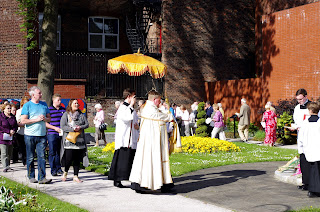This is the reflection given by one of our young people at the Corpus Christi devotions held in the parish on 2nd June
Jesus, I trust in You.
With these words I plunged myself into the unknown.
My faith had not lapsed but my regular attendance at confession had. With these words, Jesus, I trust in You, I stepped into the breach and entered the confessional for the first time in about 2 years. I had forgotten most of the rite of reconciliation and so had to inform the priest on the other side of the grille of this. He was wonderfully encouraging and sat and listened carefully to what I had to get off my chest. The few words of advice he offered to me as I came to the end of telling him my sins will stay with me forever. “Don’t make mountains out of molehills.” He then went on to elaborate on what he meant by this. In making a regular confession, he explained, we find that we can take a more realistic approach to the small hiccups along our spiritual journey with the Lord. Whereas, in the ‘once every Preston guild’ approach to confession we might find ourselves going into the confessional with a shopping list of sins we need to get off our chest and in doing so find ourselves all het up about going, so then we delay a little while longer, thinking up every excuse under the sun for not going. My dear people, the sins will not go away themselves. Through the regular practise of going to confession acknowledging our sins becomes much easier. As St. Phillip Neri said; “One of the very best means of obtaining humility is sincere and frequent confession.”
And now some humble words from St Alphonsus Ligouri on the Sacrament of Reconciliation.
Whoever you are, that design to approach the holy sacrament of penance, remember that you are going to undertake a work, on the good performance of which, more than any other duty, your eternal welfare depends.
You must, therefore, retire apart from every external source of distraction, place yourself in the presence of God, and humbly adore Him.
You should then represent to yourself that this is, as very possibly it may be, the last confession you will ever have the opportunity of making. This reflection will induce you to discharge every part of your duty, both as to the examination of your conscience, your sorrow for your sins, your firm purpose of amending your life, and the sincerity of your confession, in the most perfect manner possible.
Begin your preparation by imploring the light and grace of Almighty God, who alone can discover to you the nature of your sins, and give you true repentance.
In the examination of conscience we may feel uncomfortable as we are aware that perhaps we are not living the life that The Lord wants us to lead. The Sacrament of Reconciliation therefore provides the ways and means for us to make reparation, to reconcile ourselves with The Lord. The feeling of relief as we exit the confessional, having had the weight of our sins that we have called to mind, lifted from our shoulders is immeasurable and is a true sign of a good confession having been made.
In the absolution of our sins we are granted pardon and peace to heal our sins, to help us grow in holiness and one day reward us with eternal life through the death and resurrection of Jesus Christ who reconciled Himself to the world.
As I mentioned before, the feeling of relief that is felt after having been absolved of the sins we may have mentioned in the confessional is unique. The feeling of the grace of God passing over you as the slate is wiped clean, and that through the help of God’s grace we will try not to sin again, is wonderful. And so, brothers and sisters, I implore you to look deeply within your own lives. Are we really living the life that God wants for us? How can we be better soldiers for Christ?
Through the regular practice of examining our consciences and presenting ourselves before The Lord saying “look, this is me, this is who I am, and I’m sorry” as we enter the confessional, we can all hope to become the people that God wants us to be.
 A few weeks ago a couple came to church requesting baptism for their child. It was only at the end of the Mass that I realised that they were both deaf and used sign language to communicate. The child to be baptised and her older sibling are both hearing.
A few weeks ago a couple came to church requesting baptism for their child. It was only at the end of the Mass that I realised that they were both deaf and used sign language to communicate. The child to be baptised and her older sibling are both hearing.
































